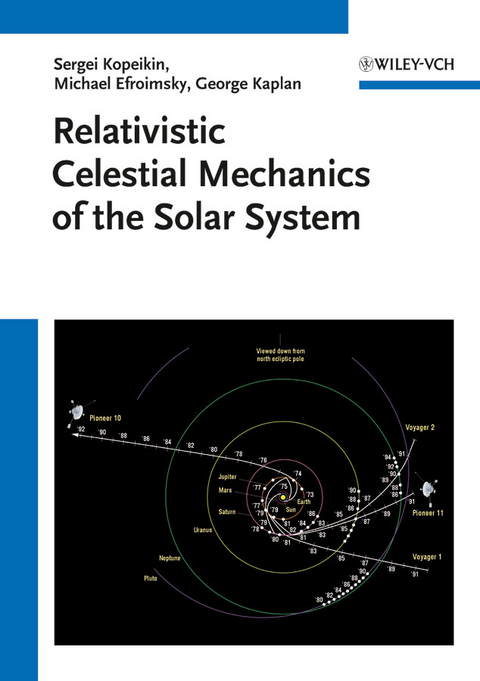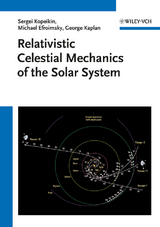Relativistic Celestial Mechanics of the Solar System
Wiley-VCH (Verlag)
978-3-527-40856-6 (ISBN)
This authoritative book presents the theoretical development of gravitational physics as it applies to the dynamics of celestial bodies and the analysis of precise astronomical observations. In so doing, it fills the need for a textbook that teaches modern dynamical astronomy with a strong emphasis on the relativistic aspects of the subject produced by the curved geometry of four-dimensional spacetime.The first three chapters review the fundamental principles of celestial mechanics and of special and general relativity. This background material forms the basis for understanding relativistic reference frames, the celestial mechanics of N-body systems, and high-precision astrometry, navigation, and geodesy, which are then treated in the following five chapters. The final chapter provides an overview of the new field of applied relativity, based on recent recommendations from the International Astronomical Union.The book is suitable for teaching advanced undergraduate honors programs and graduate courses, while equally serving as a reference for professional research scientists working in relativity and dynamical astronomy.The authors bring their extensive theoretical and practical experience to the subject. Sergei Kopeikin is a professor at the University of Missouri, while Michael Efroimsky and George Kaplan work at the United States Naval Observatory, one of the world?s premier institutions for expertise in astrometry, celestial mechanics, and timekeeping.
Sergei Kopeikin studied general relativity at the Department of Astronomy of Moscow State University, Russia. He obtained his PhD in relativistic astrophysics from Moscow State University in 1986, where he was then employed as an associate professor. In 1993, he moved to Japan to teach astronomy at Hitotsubashi University, Tokyo. He was an adjunct staff member and thereafter visiting professor at the National Astronomical Observatory of Japan. In 1997, Professor Kopeikin moved to Germany and worked at the Institute of Theoretical Physics of the Friedrich Schiller University, Jena. Three years later he accepted the position of a professor of physics at the University of Missouri, Columbia, USA. Michael Efroimsky is a research scientist at the United States Naval Observatory. His research focuses on celestial mechanics and solar system studies. He received his Ph.D. from Oxford in 1995 and he subsequently worked at Tufts, Harvard, and the University of Minnesota. An experienced teacher, having taught numerous courses to Harvard and Tufts students, Dr. Efroimsky is in a unique position to convey this complicated topic to interested readers." George Kaplan was a staff astronomer at the U.S. Naval Observatory in Washington, D.C., from 1971 to 2007, and now works as an independent consultant. He received his PhD degree from the University of Maryland, USA, in 1985. His professional interests focus on the fi eld of positional astronomy, both its observational and theoretical aspects. His work includes publications in astrometry, celestial reference systems, solar system ephemerides, Earth rotation, navigation algorithms, and astronomical software. Dr. Kaplan is currently the president of Commission 4 (Ephemerides) of the International Astronomical Union. The minor planet 16074 is named in his honor.
1 Newtonian celestial mechanics
2 Introduction to Special Relativity
3 General Relativity
4 Relativistic Reference Frames
5 Post-Newtonian Coordinate Transformations
6 Relativistic Celestial Mechanics
7 Relativistic Astrometry
8 Relativistic Geodesy
9 Relativity in IAU Resolutions
"The book is intended for graduate students and researchers working in gravitational physics applied in modern astronomy." ( Zentralblatt MATH , 1 December 2012)
| Erscheint lt. Verlag | 24.8.2011 |
|---|---|
| Sprache | englisch |
| Maße | 170 x 240 mm |
| Gewicht | 1770 g |
| Themenwelt | Sachbuch/Ratgeber ► Natur / Technik ► Weltraum / Astronomie |
| Naturwissenschaften ► Physik / Astronomie ► Astronomie / Astrophysik | |
| Schlagworte | Aeronautic & Aerospace Engineering • Aeronautic & Aerospace Engineering • Astronomie • Astronomie u. Astrophysik • Astronomy & Astrophysics • Astronomy & Astrophysics • Himmelsmechanik • Luft- u. Raumfahrttechnik • Maschinenbau • mechanical engineering • Physics • Physik • Relativistische Mechanik • Sonnensystem |
| ISBN-10 | 3-527-40856-8 / 3527408568 |
| ISBN-13 | 978-3-527-40856-6 / 9783527408566 |
| Zustand | Neuware |
| Haben Sie eine Frage zum Produkt? |
aus dem Bereich





